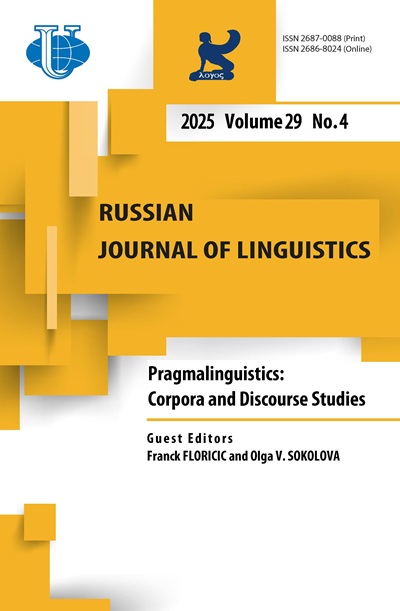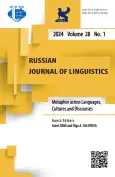French political symbolism and identity construction
- Authors: Trim R.1
-
Affiliations:
- University of Toulon
- Issue: Vol 28, No 1 (2024): Metaphor across Languages, Cultures and Discourses
- Pages: 102-122
- Section: Articles
- URL: https://bakhtiniada.ru/2687-0088/article/view/312751
- DOI: https://doi.org/10.22363/2687-0088-34560
- EDN: https://elibrary.ru/LVQQWU
- ID: 312751
Cite item
Full Text
Abstract
The present study examines how the language of political symbolism operates within the framework of identity construction. It focusses on the themes of sovereignty during the 2022 French presidency of the European Union and the national presidential election campaign. On the basis of Conceptual Metaphor Theory, it suggests that, apart from purely linguistic features, extra-linguistic factors are also essential in order to convey a global view of symbolic rhetoric. The analysis is conducted according to an overall 6-tier model of figurative origins involving the parameters of personal background, political context, cultural history, reference, conceptual metaphor and linguistic metaphor. By applying the parameters of the model, it is proposed that the core of political argumentation in the corpus analysis is based on national symbols and the conceptual mapping they embody. The basic hypothesis of the model assumes that a politician attempts to portray the symbolisation of unity in accordance with his or her political background and personal biography. A political narrative is thereby created within the current political context using predominant symbols in cultural history. An over-riding factor is the role of referential points which may determine divergence in conceptual mapping. These features then lead to the construction of conceptual metaphors which can take on a particularly hyperbolic structure in the ensuing linguistic metaphors. The implications of the study highlight the important role of symbolism in political debate, its interaction with conceptual metaphor, the relevance of extra-linguistic factors portrayed by the 6-tier model, the link between cultural history and hyperbolic linguistic structures and political divergence in similar symbols.
About the authors
Richard Trim
University of Toulon
Author for correspondence.
Email: richard.trim@univ-tln.fr
ORCID iD: 0000-0001-5499-8521
Professor Emeritus in linguistics at the University of Toulon, France. His interest in metaphor and symbolism covers a wide variety of fields including historical linguistics, contrastive linguistics and translation with the analysis of corpora in both political and literary discourse.
Toulon, FranceReferences
- Baxter, Andrew M. & Alex Nowrasteh. 2021. A brief history of U.S. Immigration Policy from the Colonial Period to the Present Day. Policy Analysis 919. Washington DC: Cato Institute. https://doi.org/10.36009/PA.919 (accessed 25 April 2023).
- Goodsell, Todd L. & Jason Whiting. 2016. An Aristotelian theory of family. Journal of Family Theory & Review 8 (4). 484-502. https://doi.org/10.1111/jftr.12169 (accessed 25 April 2023).
- Graeme, Gill & Luis F. Angosto-Ferrandez. 2018. Introduction: Symbolism and politics. Politics, Religion & Ideology 19 (4). 429-433. https://doi.org/10.1080/ 21567689.2018.1539436 (accessed 25 April 2023).
- Hittinger, John. 2013. Plato and Aristotle on the Family and the Polis. The Saint Anselm Journal 8 (2). http://www.anselm.edu (accessed 25 April 2023).
- Kövecses, Zoltán. 2005. Metaphor in Culture. Universality and Variation. Cambridge: Cambridge University Press.
- Kövecses, Zoltán. 2006. Language, Mind and Culture. Oxford: Oxford University Press.
- Lakoff, George. 1987. Women, Fire and Dangerous Things. Chicago: University of Chicago Press.
- Lakoff, George. 2003. Moral Politics: How Liberals and Conservatives Think. 2nd ed. Chicago: Chicago University Press.
- Lakoff, George. 2006. Whose Freedom? The Battle over America’s Most Important Idea. New York: Farrar Strauss Giroux.
- Lakoff, George & Mark Johnson. 1980. Metaphors We Live By. Chicago: University of Chicago Press.
- Le Gall, Laurent. 2000. Review of Maurice Agulhon. De Gaulle, histoire, symbole, mythe. Open Edition Journals, Cahier d’histoire 45 (1). Paris: Plon. https://doi.org/10.4000/ch.82 (accessed 25 April 2023).
- Macron, Emmanuel. 2021. Revoir la conférence de presse de Macron sur la présidence française de l'UE. Le Figaro. https://www.youtube.com/watch?v=0yh0oTdSNi8 (accessed 25 April 2023).
- Musolff, Andreas. 2021. Hyperbole and emotionalisation: Escalation of pragmatic effects of proverb and metaphor in the “Brexit” debate. Russian Journal of Linguistics 25 (3). 628-644. https://doi.org/10.22363/2687-0088-2021-25-3-628-644 (accessed 25 April 2023).
- Trim, Richard. 2018. Le pouvoir rhétorique de la métaphore famille dans les discours présidentiels américains et français. In Winfried Kudszus & Richard Trim (eds.), Métaphores de l’Austérité et Austérité des Métaphores. Metaphors of Austerity and The Austerity of Metaphors, 87-104. Paris: L’Harmattan.
- Trim, Richard. 2022. Mapping the Origins of Figurative Language in Comparative Literature. London: Routledge.
- Borne, Elisabeth. 2023. Paris: Assemblée Nationale. https://www.bfmtv.com/politique/ elisabeth-borne-le-49-3-n-est-pas-l-invention-d-un-dictateur_VN-202303200712.html (accessed 25 April 2023).
- Bush, George H.W. 1990. Address to the Nation on the Budget. Miller Center. https://millercenter.org/the-presidency/presidential-speeches/october-2-1990-address-nation-budget (accessed 25 April 2023).
- De Gaulle, Charles. 1940. L'appel du 18 juin du général de Gaulle. https://www.gouvernement.fr/partage/8708-l-appel-du-18-juin-du-general-de-gaulle (accessed 25 April 2023).
- Dupont-Aignan, Nicolas. 2022. La liberté avec Dupont-Aignan (Liberty with Dupont-Aignan) https://www.leparisien.fr/elections/presidentielle/presidentielle-2022-on-a-passe-en-revue-les-affiches-de-campagne-16-03-20226BRYG523VBFQBKSMGXN5R4JHCU.php (accessed 25 April 2023).
- Merriam-Webster Dictionary. Springfield, Massachusets. https://www.merriam-webster.com/dictionary/fascism (accessed 25 April 2023).
- Obama, Barack. 2010. State of the Union Address. Miller Center. https://millercenter.org/the-presidency/presidential-speeches/january-27-2010-2010-state-union-address (accessed 25 April 2023).
- Philippot, Florian. 2022. Ce que De Gaulle ferait en 2020 (What De Gaulle would do in 2020). https://www.youtube.com/watch?v=HL52Y08UCVc (accessed 25 April 2023).
- Sarkozy, Nicolas. 2007. Déclaration de M. Nicolas Sarkozy, Président de la République, sur les priorités de sa présidence, à Paris le 16 mai 2007. Vie publique. https://www.vie-publique.fr/discours/166669-declaration-de-m-nicolas-sarkozy-president-de-larepublique-sur-les-p (accessed 25 April 2023).
- Theiler, Tobias. 2017. Political symbolism. The SAGE Encyclopedia of Political Behavior, 633-634. Thousand Oaks: SAGE Publications. https://doi.org/10.4135/ 9781483391144.n284
- Tyler, John. 1841. December 7, 1841: First Annual Message. Miller Center. https://millercenter.org/the-presidency/presidential-speeches/december-7-1841-first-annual-message (accessed 25 April 2023).
- Zask, Joëlle. 2011. Liberté, égalité et pourquoi fraternité ? Lormont : Le Bord de l’eau Editions. http://joelle-zask.over-blog.com/article-liberte-egalite-et-pourquoi-fraternite89466540.html (accessed 25 April 2023).
Supplementary files











